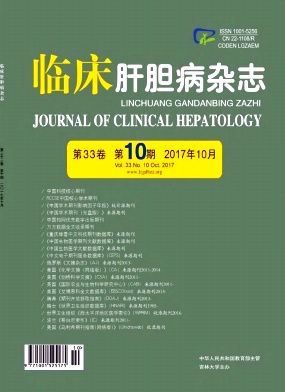| [1] | Tingting DU, Hui YAO, Xiaohong CHEN, Jie LUO, Luhong YANG, Lifang FENG, Xiaoqian CHEN, Man HU, Juan LUO. Clinical features of hypopituitarism with nonalcoholic fatty liver disease after sellar tumor surgery in children[J]. Journal of Clinical Hepatology, 2023, 39(6): 1332-1339. doi: 10.3969/j.issn.1001-5256.2023.06.013 |
| [2] | Rong JIANG, Yongxia LI. Value of triglyceride-glucose index combined with obesity index in predicting nonalcoholic fatty liver disease in individuals with obstructive sleep apnea[J]. Journal of Clinical Hepatology, 2023, 39(3): 546-551. doi: 10.3969/j.issn.1001-5256.2023.03.010 |
| [3] | Huawei QIU, Tianfu LIANG, Zhi ZHONG, Xuejiao JIA, Yang JIANG. Trend and prediction of the disease burden of acute hepatitis B in China[J]. Journal of Clinical Hepatology, 2023, 39(11): 2575-2579. doi: 10.3969/j.issn.1001-5256.2023.11.010 |
| [4] | Zhiqiang ZHANG, Wei CHEN, Bo LIU. Value of spleen volume in predicting portal hypertensive gastropathy and its severity in patients with liver cirrhosis[J]. Journal of Clinical Hepatology, 2023, 39(4): 826-833. doi: 10.3969/j.issn.1001-5256.2023.04.013 |
| [5] | Xing DAI, Ben GAO, Xinxin ZHANG, Yanyan SUN, Wentao JIANG, Jiang LI. Establishment and validation of a risk prediction model for early-stage complications after liver transplantation[J]. Journal of Clinical Hepatology, 2022, 38(2): 402-408. doi: 10.3969/j.issn.1001-5256.2022.02.027 |
| [6] | Dongxu WANG, Nan NAN, Hao BING, Lianjie LIN. Value of triglyceride-glucose index and body mass index in predicting nonalcoholic fatty liver disease in patients with type 2 diabetes mellitus[J]. Journal of Clinical Hepatology, 2022, 38(5): 1064-1068. doi: 10.3969/j.issn.1001-5256.2022.05.017 |
| [7] | Bingqi MA, Huijuan MENG, Wei ZHANG, Xiaofeng DONG, Meng WANG, Jie DOU, Yuning WU, Shiping LI. Prognostic value of several immune and inflammatory indices after curative-intent resection for intrahepatic cholangiocarcinoma[J]. Journal of Clinical Hepatology, 2022, 38(9): 2061-2066. doi: 10.3969/j.issn.1001-5256.2022.09.021 |
| [8] | Yiping LIU, Xinping LI, Lei CHEN, Jinju XIA, Kairong SONG, Ningyang JIA, Wanmin LIU. Accurate imaging diagnosis and recurrence prediction of hepatocellular carcinoma based on artificial intelligence[J]. Journal of Clinical Hepatology, 2022, 38(3): 521-527. doi: 10.3969/j.issn.1001-5256.2022.03.006 |
| [9] | Guoxu FANG, Qinghua ZHANG, Yongying HUANG, Jianmin WANG, Jingfeng LIU. Application of bioinformatics in predicting the risk of hepatocellular carcinoma[J]. Journal of Clinical Hepatology, 2022, 38(1): 15-19. doi: 10.3969/j.issn.1001-5256.2022.01.002 |
| [10] | Shaojie DUAN, Zunjing LIU, Jialiang CHEN, Shukun YAO. Value of lipid accumulation product and visceral fat index in predicting nonalcoholic fatty liver disease[J]. Journal of Clinical Hepatology, 2022, 38(1): 129-134. doi: 10.3969/j.issn.1001-5256.2022.01.020 |
| [11] | Wang ZheXuan, Wang EnXin, Xia DongDong, Bai Wei, Wang QiuHe, Yuan Jie, Li XiaoMei, Niu Jing, Guo WenGang, Li Kai, Yin ZhanXin, Han GuoHong. Value of Child-Pugh score versus albumin-bilirubin grade in predicting the prognosis of unresectable hepatocellular carcinoma treated by transarterial chemoembolization[J]. Journal of Clinical Hepatology, 2020, 36(1): 113-117. doi: 10.3969/j.issn.1001-5256.2020.01.025 |
| [12] | Feng Gong, Zhang Yan, Yan QinQin, Liu Jing, Liu ManLing, Fan LiPing, Lin SiCen, He Na, Mi Man. Construction and analysis of a predictive model for progressive liver fibrosis in nonalcoholic fatty liver disease based on LASSO regression[J]. Journal of Clinical Hepatology, 2020, 36(10): 2214-2218. doi: 10.3969/j.issn.1001-5256.2020.10.011 |
| [13] | Chen QinQin, Liang CanCan, Yang LiJun, Meng Qing, Ding YongNian. A clinical analysis of Uygur patients with acute ischemic cerebral infarction complicated by nonalcoholic fatty liver disease in Urumqi, China[J]. Journal of Clinical Hepatology, 2018, 34(6): 1259-1263. doi: 10.3969/j.issn.1001-5256.2018.06.025 |
| [14] | Zhang LiHang, Wang ShanJuan, Lu LunGen, Liu YanLi, Wang YiFei, Xie JinBi. Predictive value of coagulation test parameters for acute upper gastrointestinal bleeding in patients with liver cirrhosis[J]. Journal of Clinical Hepatology, 2018, 34(10): 2130-2135. doi: 10.3969/j.issn.1001-5256.2018.10.014 |
| [15] | Feng Gong, Han HaiJing, Qi Xue, Mi Man, Tian QiuMei, Niu ChunYan. Establishment of a noninvasive diagnosis equation for nonalcoholic fatty liver disease[J]. Journal of Clinical Hepatology, 2018, 34(6): 1264-1267. doi: 10.3969/j.issn.1001-5256.2018.06.026 |
| [16] | Zhang HaiYue, Zhou Pei, Gong ZuoJiong. Predictive value of HBs Ag quantification in pegylated interferon therapy for chronic hepatitis B[J]. Journal of Clinical Hepatology, 2016, 32(5): 977-980. doi: 10.3969/j.issn.1001-5256.2016.05.041 |
| [17] | Wang WenJun, Zhao Yan, Xia DongDong, Wang EnXin, Liu Lei, Han GuoHong. Predictive value of neutrophil-lymphocyte ratio and its dynamic change in patients with hepatocellular carcinoma undergoing transarterial chemoembolization[J]. Journal of Clinical Hepatology, 2016, 32(6): 1139-1144. doi: 10.3969/j.issn.1001-5256.2016.06.024 |
| [18] | Huang ShuiWen, Liu BaoRong, Chen MingSheng, Lin Chun, Zhou Rui, Yang HuiAn, Jiang XiaoYan, Pan Chen, Li DongLiang. Establishment of a predictive model for early virologic response in previously untreated chronic hepatitis B patients treated with telbivudine[J]. Journal of Clinical Hepatology, 2016, 32(7): 1287-1291. doi: 10.3969/j.issn.1001-5256.2016.07.014 |
| [19] | Zhang ZhiQiao, Wang GongSui, Kang KaiFu, Wu GuoBiao, Wang Peng. Analysis of high-risk groups and predictive factors for hepatic steatosis in patients with chronic hepatitis B[J]. Journal of Clinical Hepatology, 2015, 31(7): 1123-1125. doi: 10.3969/j.issn.1001-5256.2015.07.030 |
| [20] | Xie YanDi, Feng Bo, Gao Yan, Wei Lai. Predictive factors for mortality in patients with alcoholic cirrhosis[J]. Journal of Clinical Hepatology, 2013, 29(11): 852-857. doi: 10.3969/j.issn.1001-5256.2013.10.013 |








 本站查看
本站查看





 DownLoad:
DownLoad: